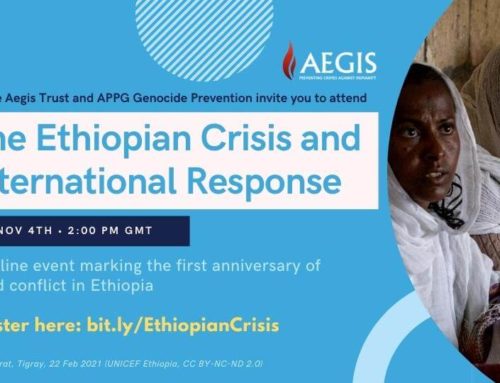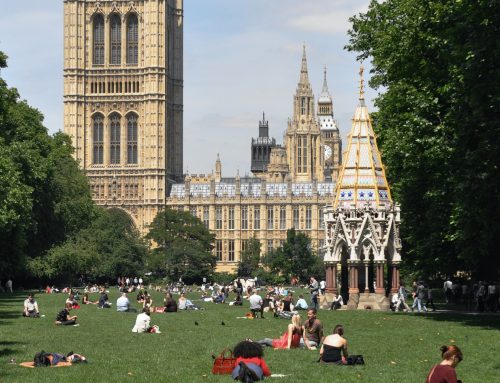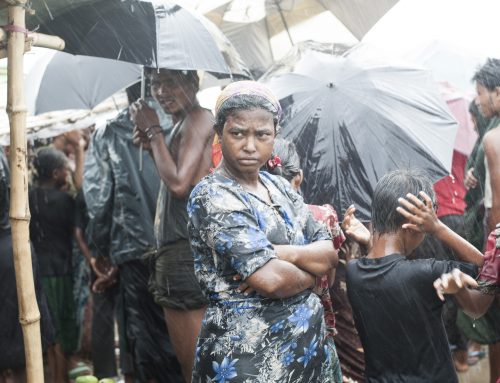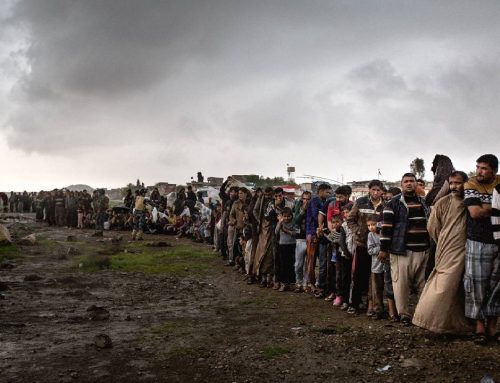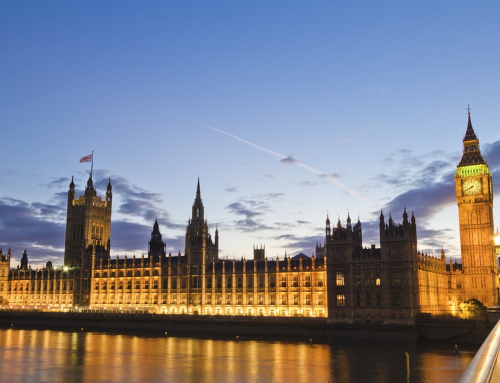Holocaust survivors have joined MPs in calling for an Atrocity Prevention Centre to be established at the Holocaust Memorial which will be built in the shadow of Parliament. Their call comes less than a week before Holocaust Memorial Day – the anniversary of the liberation of Auschwitz – when events are held across the UK to remember the six million Jews and millions of others murdered by the Nazis because of their identity.
Sharing their thoughts for an event hosted in the Palace of Westminster on Monday by the All-Party Parliamentary Group (APPG) for the Prevention of Genocide and Crimes Against Humanity, the survivors pressed the case that lessons from their experience should be applied to the prevention of similar atrocities in future.
“There are people who feel that the Holocaust is unique and should not be used for any other purposes; I strongly disagree,” says Dr Martin Stern MBE, one of the Holocaust survivors featured in a short film produced by the Aegis Trust in conjunction with the National Holocaust Centre, screened at the event (see above). “The whole point of putting a Holocaust Memorial right next to the Houses of Parliament is to teach a lesson, and if that lesson is not applied in the future it invalidates the Holocaust Memorial.”
Holocaust survivors Agnes Kaposi, Steven Frank, Hanneke Dye and Simon Winston, also featured in the film, joined MPs and representatives of various civil society organisations for Monday’s event. Titled “A Holocaust Memorial for the Future”, it was addressed by Home Secretary Amber Rudd, and by Sir Peter Bazalgette, Chair of the UK Holocaust Memorial Foundation.
APPG Chair Alison McGovern MP welcomed the attendees. “We meet at a very important time when we are considering the past, and we are remembering all of those who died and suffered in the Holocaust, and also when we are considering, rightly, our collective role in what we ought to do to prevent crimes against humanity today,” she said before welcoming the Home Secretary to offer opening remarks.
Home Secretary: “We’re not going to turn a blind eye to hate”
Amber Rudd welcomed the plan for the new Holocaust Memorial and acknowledged the power of survivor testimony. “This sort of terrible genocide doesn’t take place in a vacuum,” she noted. “It takes place after the build-up of hate, and we all have to be vigilant when we see it growing…. We’re not going to ever turn a blind eye to the sort of hate that can lead to the terrible violence we’ve seen in the past.”
Supporting the call for an atrocity prevention centre to be included at the new Holocaust Memorial, Tom Tugendhat MP, Chair of the Foreign Affairs Select Committee, recalled the loss of members of his own family in the Holocaust. “When we look at the evolution of how our own politics could go – it won’t, I’m sure with memories like this, but the way it could go if we’re not constantly aware – it’s a reminder to all of us that we have a responsibility to measure our language, to remember our political opponents are not enemies, and to remember that people, wherever they come from, are all equal and are all born free.”
“Influencing policy so the world can intervene before genocide: that is the challenge”
Lord Alf Dubs, who came to the UK as a child refugee with the Kindertransport, opened his remarks with a note of thanks to the Home Secretary. “The deal between the British Government and the French government about refugees is a good one,” he said. “You can go further; you can do more; but thank you very much.”
Turning to the matter in hand, he recalled a visit to southern Bangladesh three decades ago. “There were about twenty refugee camps for Rohingyas even then,” he said. “I talked to people in the camps, I saw them, all the way down to Cox’s Bazar and yet what did I do? I said a few things, but nothing happened. Now that’s an example of what we should not be doing. I think the world is too easily blind to what’s going on, and I think the purpose of what we’re doing today is to see if we can set up a way of influencing policy so that the world can intervene before genocide happens or when it’s just starting, rather than after it’s happened. That is the challenge today, and a challenge in which I would be happy to play as full a part as possible.”
Lord Dubs was followed by Holocaust survivors Agnes Kaposi, Steven Frank and Hanneke Dye.
Professor Agnes Kaposi drew on this year’s Holocaust Memorial Day theme, ‘the power of words’: “We live through times where words are irresponsibly spoken by people of great power, which then creates a situation of worldwide instability and fear,” she said. “But words also can be spoken in the name of peace and wisdom and truth and love. And I think that this is why we are telling our story.”
“I don’t think we should give up on ambitious politicians … or on criminals”
She recounted the empathy of students listening to her story as evidence of the power of words. “I don’t think we should give up on the indifferent majority of people around us,” she said. “I don’t think we should give up on ambitious politicians in this building who are preoccupied by party lines or personal ambition. I don’t think that we should give up on criminals…. and I even sometimes think of the perpetrators. They are human beings. I do believe – I am an optimist – that there is a human core in everyone. And the power of words should be able to reach them.”
Briefly recounting his personal experience of the Holocaust followed by arrival in the UK as “an illegal immigrant”, Theresienstadt survivor Steven Frank stressed the new Holocaust Memorial should also include a focus on other genocides. “I would just like to say one other thing to members of the house here,” he concluded. “Edmund Burke, MP for Bristol, said all those years ago, evil will thrive when good men do nothing. I hope you take on board.”
“Atrocities in the Holocaust must never be forgotten because they’re happening every day”
After recounting her own family’s tragic experience, Holocaust survivor Hanneke Dye expanded that theme. “I’m hoping that by being so close to Parliament, that when ministers, MPs and important people walk past they will remember the Holocaust, the genocides that are happening today in Yemen, in Syria, and look what happens in Burma,” she said. “Genocide is such a big word and the power of words is very important but actually I believe more in deeds, in actually avoiding for those things to happen, and I’m not sure what the British government can do on its own, but being part of an international community, I pray Mrs Rudd that you will be instrumental in bringing to an end all these dreadful, dreadful things…. Atrocities which happened in the Holocaust must never be forgotten because they are happening every day. And therefore when you walk past that memorial and you see that museum, then please remember we do not want atrocities.”
The three Holocaust survivors were followed by international lawyer Philippe Sands. “I listen to these stories with tremendous emotion and it’s a very great privilege,” he said. “Your stories are of global resonance. It was one particular unique horror that happened to you, but these are horrors that resonate as uniquely for other people around the world and so the opportunity that exists here is a remarkable opportunity … to create a centre which uses, if you like, a particular horror to address the other horrors that have been and the other horrors that will come.”
“A remarkable opportunity … to address the horrors that will come”
Currently investigating atrocities against the Yazidi in Northern Iraq, Sands turned to the US to illustrate his point. “If you want to get a sense of the importance of the possibility, the United States Holocaust Memorial Museum in Washington appears on its face to be focused on one particular horror; the horror that touched your family, that touched my family, that touched Tom Tugendhat’s family. But actually what was the institution that caused action to begin in relation to the Yazidi community? It was the Museum in Washington, because they have a research and teaching centre which stood up loud and clear and said, “there’s a genocide going on right now in Northern Iraq.” And that moved its way through government in the United States. Secretary of State Kerry and President Obama said, “this looks to us like a genocide.” And that led to a situation in which Angela Merkel, for example, created a programme to give 1100 Yazidi women refuge in Germany.”
Sands turned to Sir Peter Bazalgette, Chair of the Holocaust Memorial Foundation: “The idea that we may have a similar thing here is absolutely wonderful. That it will be right outside these windows is equally wonderful. You have my total support, Peter, and anything I can do to help make it happen, well, you can count on me.”
“Genocide prevention has to be one of the objectives”
Thanking the All-Party Parliamentary Group and the Aegis Trust for arranging this “extremely timely” meeting, Sir Peter Bazalgette outlined the work of the Holocaust Memorial Foundation and development of plans to date for the Memorial. “We are very open to what that learning centre under the memorial has, what it’s purpose should be, and I know there are many experts here in genocide prevention, and that of course has to be one of the objectives,” he said. “We want people to know more about the Holocaust and indeed other genocides. We want all the victims of the Holocaust to be recognised, including disabled people, gays and Romas. We want visitors to think about that, and of course when they’ve left that learning centre, we want them to act as a result.”
Phil Lyons, Chief Executive of the National Holocaust Centre & Museum, addressed that step from learning to action. “It resonates across the whole cohort of survivors that we have at the Centre. And I have made it my job over the last few months to solicit their views. To ask them again why they’re coming. The answer is absolutely clear; it is not to look through a lens backwards, it’s about the challenge that is today. Every one of them say, “I would not want to do this if I didn’t think it would make a difference.” So the challenge is this; how do you get that test of personal commitment? How do you transfer that to the power of action?”
“Without a centre that breathes life, it will be just another wonderful monument”
Jason Ralph, Professor of International Relations at the University of Leeds and Director of the European Centre on the Responsibility to Protect, added support on behalf of his colleagues for the Holocaust Memorial. “I would really welcome an opportunity for a new partner in this country, right outside the houses of parliament, so I very much welcome and look forward to working with the learning centre in future,” he commented.
Sonja Miley, Co-Executive Director of Waging Peace, also welcomed the Memorial, and addressed the Holocaust survivors present. “The power of your words absolutely underlines what we believe, that there needs to be a bridge between the experiences of those who have suffered atrocities and the policy-driven space,” she said. “We absolutely need to not just touch the minds but the hearts and that is how we are going to be able to effect change. So thank you.”
Carl Wilkens, the American aid worker who helped save hundreds of lives during the 1994 genocide against the Tutsi in Rwanda, had the last word at the event.
“We don’t have to be defined by our worst choices and our worst actions,” he said. “For years I defined the UN by their failures, and that’s big. The people of Rwanda have shown me and many others that we don’t have to be defined by that. Neighbours can go from being neighbours to being killers and actually in some cases back to being neighbours again. So the potential is enormous. It would be great to have this monument here but without a centre that breathes life into it, constantly telling those stories, it will be just another wonderful monument.”

